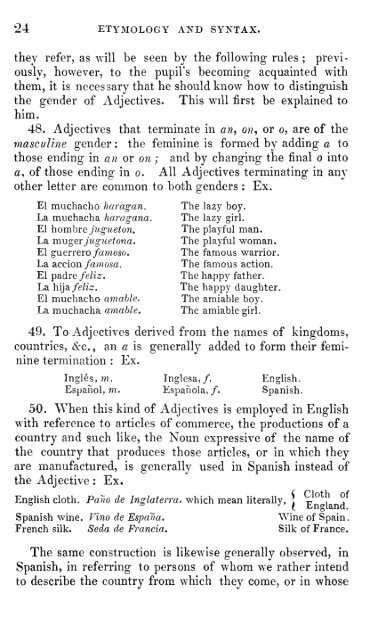A concise and simplified grammar of the Spanish language
A concise and simplified grammar of the Spanish language
A concise and simplified grammar of the Spanish language
Create successful ePaper yourself
Turn your PDF publications into a flip-book with our unique Google optimized e-Paper software.
24 ETYMOLOGY AND SYNTAX.<br />
<strong>the</strong>y refer, as will be seen by <strong>the</strong> following rules ; previ-<br />
ously, however, to <strong>the</strong> pupil's becoming- acquainted with<br />
<strong>the</strong>m, it is necessary that he should know how to distingnish<br />
<strong>the</strong> gender <strong>of</strong> Adjectives. This will first be explained to<br />
him.<br />
48. Adjectives that terminate in an, on,, or o, are <strong>of</strong> <strong>the</strong><br />
masculine gender : <strong>the</strong> feminine is formed by adding a to<br />
those ending in an or on ; <strong>and</strong> by changing <strong>the</strong> final o into<br />
a, <strong>of</strong> those ending in o. All Adjectives terminating in any<br />
o<strong>the</strong>r letter are common to both genders : Ex.<br />
El muchacho haragán. The lazy boy.<br />
La muchacha haragana. The lazy girl.<br />
El \\oxiihxQ juguetón. The playful man.<br />
La mu^Qr juguetona. The playful woman.<br />
El guerrero /amoso. The famous warrior.<br />
La acción /amosa. The famous action.<br />
El padre feliz. The happy fa<strong>the</strong>r.<br />
La h.\]dL feliz .<br />
The happy daughter.<br />
El muchacho amable. The amiable boy.<br />
La muchacha amable. The amiable girl.<br />
49. To Adjectives derived from <strong>the</strong> names <strong>of</strong> kingdoms,<br />
countries, Ike. y an a is generally added to form <strong>the</strong>ir feminine<br />
termination : Ex.<br />
Inglés, w. Inglesa,/. English.<br />
Español,»!. Espafíola, /. <strong>Spanish</strong>.<br />
50. When this kind <strong>of</strong> Adjectives is employed in English<br />
with reference to articles <strong>of</strong> commerce, <strong>the</strong> productions <strong>of</strong> a<br />
country <strong>and</strong> such like, <strong>the</strong> Noun expressive <strong>of</strong> <strong>the</strong> name <strong>of</strong><br />
<strong>the</strong> country that produces those articles, or in which <strong>the</strong>y<br />
are manufactured, is generally used in <strong>Spanish</strong> instead <strong>of</strong><br />
<strong>the</strong> Adjective : Ex.<br />
English cloth. Paño de /ng-Zaierra. which mean literally, \ c'^„^ j<br />
<strong>Spanish</strong> wine. Vino de España. Wine <strong>of</strong> Spain<br />
French silk. Seda de Francia. Silk <strong>of</strong> France.<br />
The same construction is likewise generally observed, in<br />
<strong>Spanish</strong>, in referring to persons <strong>of</strong> whom we ra<strong>the</strong>r intend<br />
to describe <strong>the</strong> country from which <strong>the</strong>y come, or in whose<br />
.

















